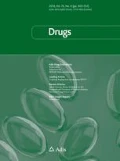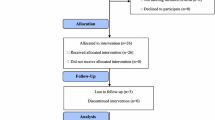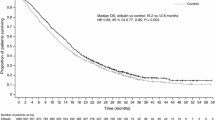Abstract
The treatment of advanced breast cancer is continually evolving, with the aim of improving the quality and duration of remission and, in some instances, survival. In this setting, the importance of quality of life cannot be underestimated, and growing attention is being paid to treatment convenience and compliance. New anticancer agents have improved efficacy, but for many of them, toxicity often remains a problem. Vinorelbine seems to represent both an active and a well tolerated treatment for metastatic breast cancer. In particular, the oral formulation has similar efficacy to that of the injectable formulation and has demonstrated generally favourable tolerability, with a high degree of acceptance by both patients and physicians. The availability of this and other novel, well tolerated and effective treatments provides greater potential to tailor treatment to meet individual patient needs and, therefore, also provide the potential to improve patient outcomes. Preliminary data suggest that oral vinorelbine may permit continued, effective chemotherapy when further parenteral therapy with more intensive and more toxic agents is considered inappropriate. Early findings also suggest that oral vinorelbine, when administered together with another new oral agent, capecitabine, may be a valid choice in metastatic breast cancer treatment. Furthermore, vinorelbine plus the monoclonal antibody trastuzumab, with or without oral capecitabine, appears to be another regimen that may be worthy of additional study in patients with human epidermal growth factor-2 positive advanced breast cancer.





Similar content being viewed by others
References
Smith I. Goals of treatment for patients with metastatic breast cancer. Semin Oncol 2006; 33 (1 Suppl. 2): S2–5
Gralow JR. Optimizing the treatment of metastatic breast cancer. Breast Cancer Res Treat 2005; 89 Suppl. 1: S9–S15
Guarneri V, Conte PF. The curability of breast cancer and the treatment of advanced disease. Eur J Nucl Med Mol Imaging 2004; 31 Suppl. 1: S149–61
Fallowfield L, Atkins L, Catt S, et al. Patients’ preference for administration of endocrine treatments by injection or tablets: results from a study of women with breast cancer. Ann Oncol 2006; 17 (2): 205–10
Liu G, Franssen E, Fitch MI, et al. Patient preference for oral versus intravenous palliative chemotherapy. J Clin Oncol 1997; 15 (1): 110–5
Catania C, Didier F, Leon ME, et al. Perception that oral anticancer treatments are less efficacious: development of a questionnaire to assess the possible prejudices of patients with cancer. Breast Cancer Res Treat 2005; 92: 265–72
Ayash LJ, Wheeler C, Fairclough D, et al. Prognostic factors for prolonged progression-free survival with high-dose chemotherapy with autologous stem-cell support for advanced breast cancer. J Clin Oncol 1995; 13 (8): 2043–9
van der Wall E, Horn T, Bright E, et al. Autologous graftversus-host disease induction in advanced breast cancer: role of peripheral blood progenitor cells. Br J Cancer 2000; 83 (11): 1405–11
Seidman AD. Monotherapy options in the management of metastatic breast cancer. Semin Oncol 2003; 30 (2 Suppl. 3): 6–10
Perez EA. Paclitaxel in breast cancer. Oncologist 1998; 3: 373–89
Figgitt DP, Wiseman LR. Docetaxel: an update of its use in advanced breast cancer. Drugs 2000; 59: 621–51
Eniu A, Palmieri FM, Perez EA. Weekly administration of docetaxel and paclitaxel in metastatic or advanced breast cancer. Oncologist 2005; 10 (9): 665–85
Paridaens R, Biganzoli L, Bruning P, et al. Paclitaxel versus doxorubicin as first-line single-agent chemotherapy for metastatic breast cancer: a European Organization for Research and Treatment of Cancer Randomized Study with cross-over. J Clin Oncol 2000; 18: 724–33
Fumoleau P, Delgado FM, Delozier T, et al. Phase II trial of weekly intravenous vinorelbine in first-line advanced breast cancer chemotherapy. J Clin Oncol 1993; 11 (7): 1245–52
Garcia-Conde J, Lluch A, Martin M, et al. Phase II trial of weekly IV vinorelbine in first-line advanced breast cancer chemotherapy. Ann Oncol 1994; 5: 854–7
Twelves CJ, Dobbs NA, Curnow A, et al. A phase II, multicenter, UK study of vinorelbine in advanced breast cancer. Br J Cancer 1994; 70: 990–3
Romero A, Rabinovich MG, Vallejo CT, et al. Vinorelbine as first-line chemotherapy for metastatic breast carcinoma. J Clin Oncol 1994; 12 (2): 336–41
Bruno S, Lira Puerto V, Mickiewicz E, et al. Phase II trial of weekly IV vinorelbine as single agent in first-line advanced breast cancer chemotherapy: the Latin-American experience. Am J Clin Oncol 1995; 18 (5): 392–6
Weber L, Vogel C, Jones S, et al. Intravenous vinorelbine as first-line and second-line therapy in advanced breast cancer. J Clin Oncol 1995; 13 (11): 2722–30
Terenziani M, Demicheli R, Brambilla C, et al. Vinorelbine: an active, non-cross-resistant drug in advanced breast cancer: results from a phase II study. Breast Cancer Res Treat 1996; 39: 285–91
Vogel C, O’Rourke M, Winer E, et al. Vinorelbine as first-line chemotherapy for advanced breast cancer in women 60 years of age or older. Ann Oncol 1999; 10 (4): 397–402
Zelek L, Barthier S, Riofrio M, et al. Weekly vinorelbine is an effective palliative regimen after failure with anthracyclines and taxanes in metastatic breast carcinoma. Cancer 2001; 92 (9): 2267–72
Udom DI, Vigushin DM, Linardou H, et al. Two weekly vinorelbine: administration in patients who have received at least two prior chemotherapy regimes for advanced breast cancer. Eur J Cancer 2000, 82
Barni S, Ardizzoia A, Bernardo G, et al. Vinorelbine as single agent in pretreated patients with advanced breast cancer. Tumori 1994; 80 (4): 280–2
Degardin M, Bonneterre J, Jecquet B, et al. Vinorelbine (navelbine) as a salvage treatment for advanced breast cancer. Ann Onocl 1994; 5 (5): 423–6
Gasparini G, Caffo O, Barni S, et al. Vinorelbine is an active antiproliferative agent in pretreated advanced breast cancer patients: a phase II study. J Clin Oncol 1994; 12 (10): 2094–101
Fazeny B, Zifko U, Meryn S, et al. Vinorelbine-induced neurotoxicity in patients with advanced breast cancer pretreated with paclitaxel: a phase II study. Cancer Chemother Pharmacol 1996; 39 (1–2): 150–6
Nistico C, Garufi C, Milella M, et al. Weekly schedule of vinorelbine in pretreated breast cancer patients. Breast Cancer Res Treat 2000; 59 (3): 223–9
Crown J, Dieras V, Kaufmann M, et al. Chemotherapy for metastatic breast cancer-report of a European expert panel. Lancet Oncol 2002; 3 (12): 719–27
De Pas T, Sbanotto A, Catania C, et al. Oral administration of vinorelbine can overcome intractable endovenous-vinorelbine-associated acute tumor pain. Support Care Cancer 2005; 13 (3): 194–5
Mano M. Vinorelbine in the management of breast cancer: new perspectives, revived role in the era of targeted therapy. Cancer Treat Rev 2006; 32 (2): 106–18
Slamon DJ, Leyland-Jones B, Shak S, et al. Use of chemotherapy plus a monoclonal antibody against HER2 for metastatic breast cancer that overexpresses HER 2. NEJM 2001; 11: 783–92
Seidman AD, Fornier MN, Esteva FJ, et al. Weekly trastuzumab and paclitaxel therapy for metastatic breast cancer with analysis of efficacy by HER2 immunophenotype and gene amplification. J Clin Oncol 2001; 19 (10): 2587–95
Esteva FJ, Valero V, Booser D, et al. Phase II study of weekly docetaxel and trastuzumab for patients with HER-2-overexpressing metastatic breast cancer. J Clin Oncol 2002; 20 (7): 1800–8
Marty M, Cognetti F, Maraninchi D, et al. Randomized phase II trial of the efficacy and safety of trastuzumab combined with docetaxel in patients with human epidermal growth factor receptor 2-positive metastatic breast cancer administered as first-line treatment: the M77001 study group. J Clin Oncol 2005; 23 (19): 4265–74
Pegram MD, Konecny GE, O’Callaghan C, et al. Rational combinations of trastuzumab with chemotherapeutic drugs used in the treatment of breast cancer. J Natl Cancer Inst 2004; 96 (10): 739–49
Montemurro F, Valabrega G, Aglietta M. Trastuzumab-based combination therapy for breast cancer. Expert Opin Pharmacother 2004; 5 (1): 81–96
De Laurentiis M, Cancello G, Zinno L, et al. Targeting HER2 as a therapeutic strategy for breast cancer: a paradigmatic shift of drug development in oncology. Ann Oncol 2005; 16 Suppl. 4: iv7–iv13
Rugo HS. Bevacizumab in the treatment of breast cancer: rationale and current data. Oncologist 2004; 9 Suppl. 1: 43–9
de Gramont A, Cutsem E. Investigating the potential of bevacizumab in other indications: metastatic renal cell, non-small cell lung, pancreatic and breast cancer. Oncology 2005; 69 Suppl. 3: 46–56
Moy B, Goss PE. Lapatinib: current status and future directions in breast cancer. Oncologist 2006; 11 (10): 1047–57
Miller KD, Chap LI, Holmes FA, et al. Randomized phase III trial of capecitabine with bevacizumab plus capecitabine in patients with previously treated metastatic breast cancer. J Clin Oncol 2005; 23 (4): 792–9
Wedam SB, Low JA, Yang SX, et al. Antiangiogenic and antitumour effects of bevacizumab in patients with inflammatory and locally advanced breast cancer. J Clin Oncol 2006; 24 (5): 769–77
Marty M, Fumoleau P, Adenis A, et al. Oral vinorelbine pharmacokinetics and absolute bioavailability study in patients with solid tumours. Ann Oncol 2001; 12: 1643–9
Variol P, Nguyen L, Tranchard B, et al. A simultaneous oral/intravenous population pharmacokinetics model for vinorelbine. Eur J Clin Pharmacol 2002; 58: 467–76
Jassem J, Kosmidis P, Ramiau R, et al. Oral vinorelbine in combination with cisplatin: a novel active regimen in advanced non-small-cell lung cancer. Ann Oncol 2003; 14 (11): 1634–9
Freyer G, Delozier T, Lichinister M, et al. Phase II study of oral vinorelbine in first-line advanced breast cancer chemotherapy. J Clin Oncol 2003; 21: 35–40
Amadori D, Koralewski P, Tekiela A, et al. Efficacy and safety of navelbine oral (NVBO) in first line metastatic breast cancer (MBC) [abstract]. Eur J Cancer 2001; 37 Suppl. 6: 195
Multinational Association of Supportive Care in Cancer. The 2004 Perugia Antiemetic Consensus Guidelines. Support Care Cancer 2005; 13 (2): 77–132
Bartsch R, Wenzel C, Pluschnig U, et al. Oral vinorelbine alone or in combination with trastuzumab in advanced breast cancer: results from a pilot trial. Cancer Chemother Pharmacol 2006; 57: 554–8
Baweja M, Suman VJ, Fitch TR, et al. Phase II trial of oral vinorelbine for the treatment of metastatic breast cancer in patients ≥65 years of age: an NCCTG study. Ann Oncol 2006; 17: 623–9
Carelle N, Piotto E, Bellanger A, et al. Changing patient perceptions of the side effects of cancer chemotherapy. Cancer 2002; 95 (1): 155–63
Coates AS, Stockier M, Wilcken N. Controversies in metastatic breast cancer: optimal duration of chemotherapy. ASCO Educational Handbook 2003: 119–21
Sikov WM, Akerley W, Kahanic S, et al. Multicenter, 3-arm randomized study of high-dose weekly paclitaxel versus standard-dose weekly paclitaxel for metastatic breast cancer [abstract]. Proceedings of the 38th Annual Meeting of the American Society of Clinical Oncology; 2002 May 18; Orlando (FL): 34
Von Hoff DD, Layard MW, Basa P, et al. Risk factors for doxirubicin-induced congestive heart failure. Ann Intern Med 1979; 91 (5): 710–7
Brugnatelli S, Riccardi A, Danova M, et al. Sequential docetaxel and vinorelbine for patients with advanced breast cancer previously treated with anthracyclines: a phase II study. Oncol Rep 2001; 8 (4): 801–5
Gralow JR, Ellis GK, Williams MA, et al. Docetaxel + vinorelbine with concurrent G-CSF support: a phase II study in stage IV breast cancer [abstract]. Proceedings of the 36th Annual Meeting of the American Society of Clinical Oncology; 2000 May 20–23; New Orleans (LA)
Kornek GV, Ulrich-Pur H, Penz M, et al. Treatment of advanced breast cancer with vinorelbine and docetaxel with or without human granulocyte colony-stimulating factor. J Clin Oncol 2001; 19 (3): 621–7
Rodriguez J, Calvo E, Cortes J, et al. Docetaxel plus vinorelbine as salvage chemotherapy in advanced breast cancer: a phase II study. Breast Cancer Res Treat 2002; 76 (1): 47–56
Sambiasi D, Misino A, Silvestris N, et al. A phase I study of vinorelbine plus capecitabine in patients with advanced breast cancer [abstract no. 2001]. Ann Oncol 2002; 13 Suppl. 5: 56
Welt A, Von Minckwitz C, Oberhoff C, et al. Phase I–II study of capecitabine and vinorelbine in pretreated patients with metastatic breast cancer. Ann Oncol 2005; 16: 64–9
Ahn JH, Kim SB, Kim TW, et al. Capecitabine and vinorelbine in patients metastatic breast cancer previously treated with anthracycline and taxane. J Korean Med Sci 2004; 19: 547–53
Ghosn M, Chahine M, Kattan G, et al. Phase II study of sequential administration of vinorelbine-capecitabine followed by weekly docetaxel as first line chemotherapy in metastatic breast cancer [abstract no. 817]. Proc Am Soc Clin Oncol 2004; 23: 80
Stuart N, Bishop JL, Johnson SRP, et al. Vinorelbine and capecitabine (VX) for advanced breast cancer: a phase II study showing good activity and potential for further development [abstract no. 183]. Proc Am Soc Clin Oncol 2003; 22: 46
Domenech GH, Perez A, Vogel CL. Vinorelbine/capecitabine (VINOCAP) combination remission induction therapy for metastatic breast cancer (MBC) [abstract no. 1939]. Proc Am Soc Clin Oncol 2001; 20: 48
Nolé F, Catania C, Sanna G, et al. Dose-finding and pharmacokinetic study of an all-oral combination regimen of oral vinorelbine and capecitabine for patients with metastatic breast cancer. Ann Oncol 2006; 17: 322–9
Nolé F, Catania C, Sanna G, et al. Phase II study with dose finding of oral vinorelbine in combination with capecitabine as first line chemotherapy of metastatic breast cancer (MBC): preliminary results of the phase II part of the study [abstract no. 408]. Eur J Can 2006; Suppl. 4
Finek K, Holubec L, Elgrova L, et al. The effect of oral vinorelbine and capecitabine in patients with metastatic breast cancer. J Clin Oncol (Meeting Abstracts) 2006; 24 (18S): 10605
Delcambre C, Veyret C, Levy C, et al. A phase I/II study of capecitabine combined with oral vinorelbine as first- or second-line therapy in locally advanced or metastatic breast cancer. Breast Cancer Res Treat 2005; 94: Suppl. 1: P1081
Chan A, Tubiana N, Ganju V, et al. Optimal tolerance of an all-oral combination chemotherapy of oral vinorelbine (NVBo), capecitabine (C) with/without trastuzumab (T) in metastatic breast cancer (MBC) patients (pts): safety results of two international multicenter studies. J Clin Oncol (Meeting Abstracts) 2006; 24 (18S): 10607
Emens LA. Trastuzumab: targeted therapy for the management of HER-2/neu-overexpressing metastatic breast cancer. Am J Ther 2005; 12 (3): 243–53
Gasparini G, Longo R, Torino F, et al. Therapy of breast cancer with molecular targeting agents. Ann Oncol 2005; 16 Suppl. 4: iv28–36
Rueckert S, Ruehl I, Kahlert S, et al. A monoclonal antibody as an effective therapeutic agent in breast cancer: trastuzumab. Expert Opin Biol Ther 2005; 5 (6): 853–66
Pegram MD, Hsu S, Lewis G, et al. Inhibitory effects of combination of HER-2/neu antibody and chemotherapeutic agents used for treatment of human breast cancers. Oncogene 1999; 18 (13): 2241–51
Jahanzeb M. Trastuzumab-based combinations in metastatic breast cancer: how to make a choice. Clin Breast Cancer 2003; 1: 28–38
Perez EA, Rodeheffer R. Clinical cardiac tolerability of trastuzumab. J Clin Oncol 2004; 22 (2): 322–9
Suter TM, Cook-Bruns N, Barton C. Cardiotoxicity associated with trastuzumab (Herceptin) therapy in the treatment of metastatic breast cancer. Breast 2004; 13 (3): 173–83
Untch M, Eidtmann H, du Bois A, et al. Cardiac safety of trastuzumab in combination with epirubicin and cyclophosphamide in women with metastatic breast cancer: results of a phase I trial. Eur J Cancer 2004; 40 (7): 988–97
Burstein HJ, Harris LN, Marcom PK, et al. Trastuzumab and vinorelbine as first-line therapy for HER2-overexpressing metastatic breast cancer: multicenter phase II trial with clinical outcomes, analysis of serum tumor markers as predictive factors, and cardiac surveillance algorithm. J Clin Oncol 2003; 21 (15): 2889–95
Burstein HJ, Kuter I, Campos SM, et al. Clinical activity of trastuzumab and vinorelbine in women with HER2-overexpressing metastatic breast cancer. J Clin Oncol 2001; 19 (10): 2722–30
Jahanzeb M, Mortimer JE, Yunus F, et al. Phase II trial of weekly vinorelbine and trastuzumab as first-line therapy in patients with HER2 (+) metastatic breast cancer. Oncologist 2002; 7 (5): 410–7
Bernardo G, Palombo R, Bernardo A. Weekly trastuzumab (Herceptin) and vinorelbine (Navelbine) in chemonaive patients with HER2-overexpressing metastatic breast cancer: a phase II trial [abstract]. Ann Oncol 2002; 13: 51
Suzuki Y, Tokuda Y, Saito Y, et al. Combination of trastuzumab and vinorelbine in metastatic breast cancer. Jpn J Clin Oncol 2003; 33: 514–7
Fountzilas G, Tsavdaridis D, Kalogera-Fountzila A, et al. Weekly paclitaxel as first-line chemotherapy and trastuzumab in patients with advanced breast cancer: a Hellenic Cooperative Oncology Group phase II study. Ann Oncol 2001; 12 (11): 1545–51
Janku F, Pribylova O, Zimovjanova M, et al. 4-years results of weekly trastuzumab and paclitaxel in the treatment of women with HER2/neu overexpressing advanced breast cancer: single institution prospective study. Bull Cancer 2004; 91 (10): E279–83
Chan A, Tubiana N, Ganju V, et al. Optimal tolerance of an all-oral combination chemotherapy (CT) of oral viorelbine (NVBo), capecitabine (C) with/without trastuzumab (T) in metastatic breast cancer (MBC) patients (pts): safety results of two international multicenter studies [abstract no. 10607]. Proc Annu Meet Am Soc Clin Oncol 2006; 24 (18s): 576s
Acknowledgements
Dr Aapro has acted as a consultant for and received honoraria and/or grants from Sanofi-Aventis, Roche and Pierre Fabre. Dr Conte has acted as a consultant for Bristol-Myers Squibb. Drs Gonzalez and Trillet-Lenoir have no conflicts of interest to declare. Preparation of this manuscript was supported by Pierre Fabre. Editorial assistance for the development of this manuscript was provided by Wolters Kluwer Health Medical Communications.
Author information
Authors and Affiliations
Corresponding author
Rights and permissions
About this article
Cite this article
Aapro, M.S., Conte, P., González, E.E. et al. Oral Vinorelbine. Drugs 67, 657–667 (2007). https://doi.org/10.2165/00003495-200767050-00002
Published:
Issue Date:
DOI: https://doi.org/10.2165/00003495-200767050-00002




